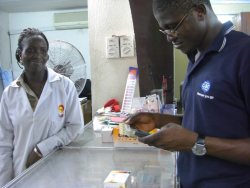Sproxil completes Nigerian text message verification pilot
Phil Taylor, 04-Jun-2010
 Sproxil completed a proof-of-concept pilot of its text message-based mobile product authentication (MPA) service in Nigeria last month, with nearly 7,000 people using the system to check whether a drug for diabetes was genuine.
Sproxil completed a proof-of-concept pilot of its text message-based mobile product authentication (MPA) service in Nigeria last month, with nearly 7,000 people using the system to check whether a drug for diabetes was genuine.
During the pilot around 735,000 packs of Glucophage 500mg (metformin) product made by pharmaceutical company Merck Sante and distributed by Nigerian company Biofem had a scratch sticker carrying a code affixed to the blister pack which could be texted to a toll-free number. Within seconds, a return message would indicate if the product was real or fake.
The pilot ran at 125 pharmacies in three Nigerian cities: the capital Lagos, Abuja and Port Harcourt.
Over the course of the pilot, which ran from February 2 to May 12, Sproxil's system handled more than 22,600 inbound and outbound SMS messages over the duration of the 100-day trial from 6,761 unique users, with just two recorded errors. In May, the system also successfully identified counterfeiting activity in the field, according to Sproxil.
Speaking with SecuringPharma.com today, Sproxil chief executive Ashifi Gogo noted that Biofem has continued to use the technology since the pilot ended and to date more than 34,000 messages have been sent from nearly 10,000 unique customers. Labels are being added to blisters at a rate of around 50,000 a week.
The pilot also showed that the mobile network required to support the MPA service at the point of sale in Nigeria is robust, with three of the four providers included in the pilot offering 100 per cent availability. One other provider fell down a little with 91 per cent availability but has recently upgraded its infrastructure.
Mobile phone use is also fairly high in Nigeria, with more than half the population (56 per cent) owning their own handset.
Sproxil's chief executive Ashifi Gogo said the findings indicate that Nigerians will use the system to verify their medicine packs. "They are increasingly insisting on Glucophage with authentication labels," he said.
Predictably, counterfeiters responded quickly to the introduction of the new technology. Some pharmacies were identified co-selling genuine and fake Glucophage in a box, saying that one Sproxil label 'authenticates all blisters', according to Gogo.
"Biofem found this out through our technology and stopped the practice at some retail points," he said. "And now they know which points of sale might have interests that don't necessarily align with public good."
Moreover, the cost of the implementation appears to have been offset by sales recovery and brand retention, according to Gogo, who notes that while Biofem increased price of Glucophage in 2010 this was in line with price fluctuations in prior years.
"A large number of pharmacies began sourcing from Biofem because consumers refused to buy Glucophage 500mg without Sproxil's labels," he said.
"Market share has been recaptured from counterfeiters. This is what brought a lot of value to Biofem and Merck," he said.
The pilot has used labels affixed to the blister pack at a secure Biofem facility, but in future it will be possible for pharmaceutical manufacturers to print codes in-house.
"Pharma companies that have the capability can even generate their own codes and securely upload them to us," according to Gogo. At the moment, Sproxil and its partners outsource printing to suppliers who print for large mobile phone multinationals.
With the pilot complete, Sproxil's attention is now turning to a scale-up of the MPA system, and Nigeria's National Agency for Food and Drug Administration and Control (NAFDAC) is scheduled to hold a meeting on June 11 to review the pilot results and examine scale-up options.
Nigeria has been wise not to issue a mandate for a technological solution, said Gogo, pointing to the problems in Brazil, Turkey and the USA in pushing through legislative requirements.
"NAFDAC is encouraging industry to sign on because they believe the solution works and has commercial benefits, such as an increase in sales," said Gogo.
"In a free market, that is a good enough reason to sign on."
- Meanwhile, Sproxil's efforts are bring recognised with international awards. The MPA system won the Mobile Infrastructure category in the 7th Annual MITX Technology Awards, organised by the Massachusetts Innovation and Technology Exchange, and also picked up a PricewaterhouseCoopers Promise Award at the same event.
And yesterday the company won the Boston heats of the IBM SmartCamp scheme, which tries to identify start-up companies which can make a big impact on the management of the world's resources. Sproxil is now in the running to be named 'World’s Smartest Start-up' at the culmination of the competition later this year.
Related articles:
HP helps mPedigree test its SMS drug verification
Nigeria adopts SMS tech to thwart counterfeiters
Counterfeit drugs take hefty toll in developing world
mPedigree: bringing safer medicines to Africa via the mobile phone



©
SecuringIndustry.com




 Sproxil completed a proof-of-concept pilot of its text message-based mobile product authentication (MPA) service in Nigeria last month, with nearly 7,000 people using the system to check whether a drug for diabetes was genuine.
Sproxil completed a proof-of-concept pilot of its text message-based mobile product authentication (MPA) service in Nigeria last month, with nearly 7,000 people using the system to check whether a drug for diabetes was genuine.